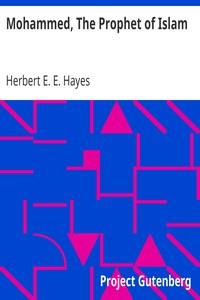Mohammed, The Prophet of Islam by Herbert E. E. Hayes
"Mohammed, The Prophet of Islam" by Herbert E. E. Hayes is a historical account written in the early 20th century, specifically during the early 1910s. This essay presents a critical examination of the life of Mohammed, the founder of Islam, exploring his character, teachings, and the societal conditions that characterized his era. Hayes aims to provide insights into the implications of Mohammed's actions and ideologies, reflecting on how they have influenced the
course of Islamic society. The book delves into Mohammed's early life, his "call" to prophecy, and the subsequent formation of the Islamic community in Medina. It outlines the tumultuous political landscape of Arabia during Mohammed's time, detailing how he transitioned from a merchant to a religious and political leader. Through recounting key events, such as battles and treaties, Hayes illustrates Mohammed's ambitions and strategies, including the controversial justifications he employed for warfare and polygamy. The author critiques aspects of Mohammed's teachings and the religious doctrines that arose from them, considering their impact on the status of women and the treatment of non-Muslims within Islamic society, ultimately questioning the ethical underpinnings of his claims to divine revelation. (This is an automatically generated summary.)
Read or download for free
Not sure how to start? Reading Guide
| Reading Options | Url | Size | |||
|---|---|---|---|---|---|
| Read now! | https://www.gutenberg.org/ebooks/14064.html.images | 95 kB | |||
| EPUB3 (E-readers incl. Send-to-Kindle) | https://www.gutenberg.org/ebooks/14064.epub3.images | 108 kB | |||
| EPUB (older E-readers) | https://www.gutenberg.org/ebooks/14064.epub.images | 107 kB | |||
| EPUB (no images, older E-readers) | https://www.gutenberg.org/ebooks/14064.epub.noimages | 97 kB | |||
| Kindle | https://www.gutenberg.org/ebooks/14064.kf8.images | 235 kB | |||
| older Kindles | https://www.gutenberg.org/ebooks/14064.kindle.images | 223 kB | |||
| Plain Text UTF-8 | https://www.gutenberg.org/ebooks/14064.txt.utf-8 | 88 kB | |||
| Download HTML (zip) | https://www.gutenberg.org/cache/epub/14064/pg14064-h.zip | 107 kB | |||
| There may be more files related to this item. | |||||
Similar Books
About this eBook
| Author | Hayes, Herbert E. E. (Herbert Edward Elton) |
|---|---|
| Title | Mohammed, The Prophet of Islam |
| Credits | E-text prepared by Michael Ciesielski and the Project Gutenberg Online Distributed Proofreading Team |
| Reading Level | Reading ease score: 54.4 (10th to 12th grade). Somewhat difficult to read. |
| Language | English |
| LoC Class | BP: Philosophy, Psychology, Religion: Islam, Bahaism, Theosophy, Other and new beliefs |
| Subject | Muhammad, Prophet, -632 |
| Category | Text |
| EBook-No. | 14064 |
| Release Date | Nov 16, 2004 |
| Most Recently Updated | Oct 28, 2024 |
| Copyright Status | Public domain in the USA. |
| Downloads | 243 downloads in the last 30 days. |
| Project Gutenberg eBooks are always free! | |

